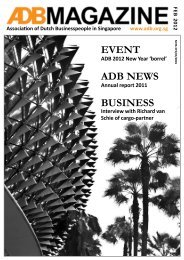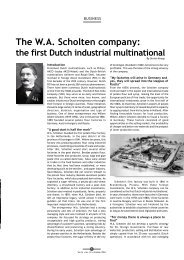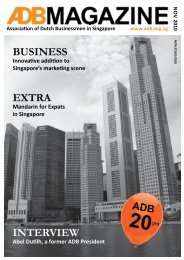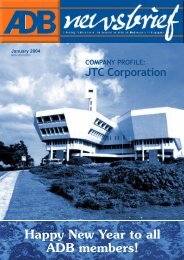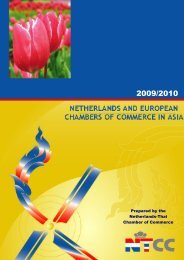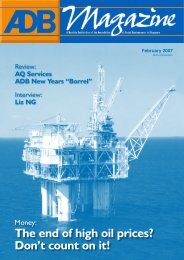October - November 2012 - Association of Dutch Businessmen
October - November 2012 - Association of Dutch Businessmen
October - November 2012 - Association of Dutch Businessmen
You also want an ePaper? Increase the reach of your titles
YUMPU automatically turns print PDFs into web optimized ePapers that Google loves.
know your tax<br />
THE FLEXIBILISATION OF ‘B.V.’ LAW<br />
Text Raymond H<strong>of</strong>stede, Loyens & Loeff, Singapore<br />
Introduction<br />
Many entrepreneurs worldwide carry on a business in<br />
the form <strong>of</strong> a <strong>Dutch</strong> private company with limited liability.<br />
In <strong>Dutch</strong>, the ‘besloten vennootschap met beperkte<br />
aansprakelijkheid’ is usually referred to as the B.V. As<br />
from autumn <strong>of</strong> this year, the rules for the B.V., with<br />
respect to the protection <strong>of</strong> capital, will be simplified and<br />
the governance structure <strong>of</strong> the articles <strong>of</strong> association<br />
will become more flexible. The Act on simplification and<br />
flexibilisation <strong>of</strong> private limited liability companies (the<br />
‘Act’) will come into force on 1 <strong>October</strong> <strong>2012</strong>, and will<br />
apply to all B.V.s (hereafter referred to as “FlexBV”). This<br />
article aims to summarise some key changes.<br />
Non-voting shares and non-pr<strong>of</strong>it shares<br />
The Act allows the articles <strong>of</strong> association <strong>of</strong> the company to<br />
exclude certain shares from voting (1) , thereby making it far<br />
easier to allocate voting rights to individual shareholders<br />
separately. The company will also be able to issue shares<br />
with more than one vote, which could be conducive to<br />
structuring joint ventures or family owned companies.<br />
Furthermore, the FlexBV gives the opportunity to create<br />
shares with a right to vote, but without an entitlement<br />
to pr<strong>of</strong>its or reserves (i.e. non-pr<strong>of</strong>it shares). As a result<br />
<strong>of</strong> all these changes, shareholders will be more flexible in<br />
structuring their mutual relationship.<br />
Shareholders resolutions and general meetings<br />
The Act also provides for some amendments in the<br />
provisions on decision-making by the general meeting <strong>of</strong><br />
shareholders. Under the Act, it will be possible to have<br />
general meetings <strong>of</strong> shareholders outside the Netherlands.<br />
Decision-making outside a meeting will be allowed in<br />
more cases and will no longer require a unanimous vote<br />
<strong>of</strong> all shareholders. The statutory deadline for convening<br />
a shareholders’ meeting will be shortened from fifteen to<br />
eight days before the date <strong>of</strong> the meeting.<br />
Direct rights <strong>of</strong> appointment<br />
Under the Act, it is possible to grant a direct right to the<br />
meeting <strong>of</strong> holders <strong>of</strong> shares <strong>of</strong> a certain class or specified<br />
number to appoint or dismiss one or more management<br />
board members. A condition for the application <strong>of</strong> the<br />
direct right <strong>of</strong> appointment is that every shareholder<br />
with voting rights, directly or indirectly, may vote on<br />
the appointment <strong>of</strong> at least one management board<br />
member. As a result, the articles <strong>of</strong> association may allow<br />
a shareholder to appoint, suspend and dismiss its “own”<br />
managing or supervisory director.<br />
Instructions to the management board<br />
With the FlexBV, the articles <strong>of</strong> association can provide<br />
that the management board shall act according to the<br />
instructions (2) <strong>of</strong> the general meeting <strong>of</strong> shareholders<br />
or another corporate body. The management board is<br />
obliged to follow these instructions, but will retain its own<br />
responsibility as management board. It may (and must)<br />
refuse to follow instructions if doing so is contrary to the<br />
interest <strong>of</strong> the company and the business related thereto.<br />
Transfer restrictions optional<br />
With respect to the private character <strong>of</strong> the B.V., a<br />
remarkable change has been implemented: including<br />
transfer restrictions contained in the articles <strong>of</strong> association<br />
22





